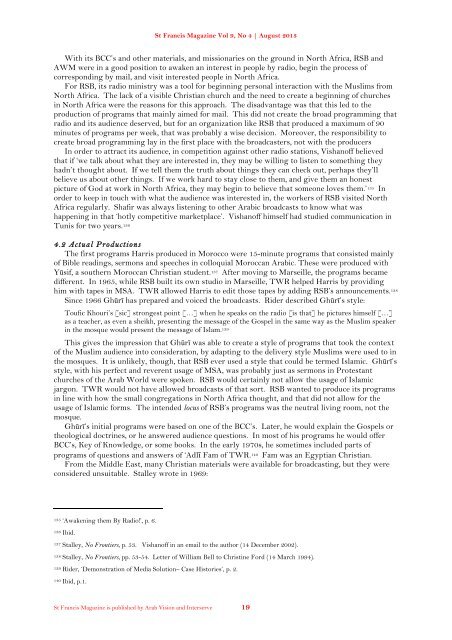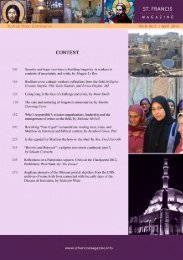Download the pdf - St.Francis Magazine
Download the pdf - St.Francis Magazine
Download the pdf - St.Francis Magazine
You also want an ePaper? Increase the reach of your titles
YUMPU automatically turns print PDFs into web optimized ePapers that Google loves.
<strong>St</strong> <strong>Francis</strong> <strong>Magazine</strong> Vol 9, No 4 | August 2013<br />
With its BCC’s and o<strong>the</strong>r materials, and missionaries on <strong>the</strong> ground in North Africa, RSB and<br />
AWM were in a good position to awaken an interest in people by radio, begin <strong>the</strong> process of<br />
corresponding by mail, and visit interested people in North Africa.<br />
For RSB, its radio ministry was a tool for beginning personal interaction with <strong>the</strong> Muslims from<br />
North Africa. The lack of a visible Christian church and <strong>the</strong> need to create a beginning of churches<br />
in North Africa were <strong>the</strong> reasons for this approach. The disadvantage was that this led to <strong>the</strong><br />
production of programs that mainly aimed for mail. This did not create <strong>the</strong> broad programming that<br />
radio and its audience deserved, but for an organization like RSB that produced a maximum of 90<br />
minutes of programs per week, that was probably a wise decision. Moreover, <strong>the</strong> responsibility to<br />
create broad programming lay in <strong>the</strong> first place with <strong>the</strong> broadcasters, not with <strong>the</strong> producers<br />
In order to attract its audience, in competition against o<strong>the</strong>r radio stations, Vishanoff believed<br />
that if ‘we talk about what <strong>the</strong>y are interested in, <strong>the</strong>y may be willing to listen to something <strong>the</strong>y<br />
hadn’t thought about. If we tell <strong>the</strong>m <strong>the</strong> truth about things <strong>the</strong>y can check out, perhaps <strong>the</strong>y’ll<br />
believe us about o<strong>the</strong>r things. If we work hard to stay close to <strong>the</strong>m, and give <strong>the</strong>m an honest<br />
picture of God at work in North Africa, <strong>the</strong>y may begin to believe that someone loves <strong>the</strong>m.’ 135 In<br />
order to keep in touch with what <strong>the</strong> audience was interested in, <strong>the</strong> workers of RSB visited North<br />
Africa regularly. Shafir was always listening to o<strong>the</strong>r Arabic broadcasts to know what was<br />
happening in that ‘hotly competitive marketplace’. Vishanoff himself had studied communication in<br />
Tunis for two years. 136<br />
4.2 Actual Productions<br />
The first programs Harris produced in Morocco were 15-minute programs that consisted mainly<br />
of Bible readings, sermons and speeches in colloquial Moroccan Arabic. These were produced with<br />
Yūsif, a sou<strong>the</strong>rn Moroccan Christian student. 137 After moving to Marseille, <strong>the</strong> programs became<br />
different. In 1965, while RSB built its own studio in Marseille, TWR helped Harris by providing<br />
him with tapes in MSA. TWR allowed Harris to edit those tapes by adding RSB’s announcements. 138<br />
Since 1966 Ghūrī has prepared and voiced <strong>the</strong> broadcasts. Rider described Ghūrī’s style:<br />
Toufic Khouri’s [sic] strongest point […] when he speaks on <strong>the</strong> radio [is that] he pictures himself […]<br />
as a teacher, as even a sheikh, presenting <strong>the</strong> message of <strong>the</strong> Gospel in <strong>the</strong> same way as <strong>the</strong> Muslim speaker<br />
in <strong>the</strong> mosque would present <strong>the</strong> message of Islam. 139<br />
This gives <strong>the</strong> impression that Ghūrī was able to create a style of programs that took <strong>the</strong> context<br />
of <strong>the</strong> Muslim audience into consideration, by adapting to <strong>the</strong> delivery style Muslims were used to in<br />
<strong>the</strong> mosques. It is unlikely, though, that RSB ever used a style that could be termed Islamic. Ghūrī’s<br />
style, with his perfect and reverent usage of MSA, was probably just as sermons in Protestant<br />
churches of <strong>the</strong> Arab World were spoken. RSB would certainly not allow <strong>the</strong> usage of Islamic<br />
jargon. TWR would not have allowed broadcasts of that sort. RSB wanted to produce its programs<br />
in line with how <strong>the</strong> small congregations in North Africa thought, and that did not allow for <strong>the</strong><br />
usage of Islamic forms. The intended locus of RSB’s programs was <strong>the</strong> neutral living room, not <strong>the</strong><br />
mosque.<br />
Ghūrī’s initial programs were based on one of <strong>the</strong> BCC’s. Later, he would explain <strong>the</strong> Gospels or<br />
<strong>the</strong>ological doctrines, or he answered audience questions. In most of his programs he would offer<br />
BCC’s, Key of Knowledge, or some books. In <strong>the</strong> early 1970s, he sometimes included parts of<br />
programs of questions and answers of ‘Adlī Fam of TWR. 140 Fam was an Egyptian Christian.<br />
From <strong>the</strong> Middle East, many Christian materials were available for broadcasting, but <strong>the</strong>y were<br />
considered unsuitable. <strong>St</strong>alley wrote in 1969:<br />
135 ‘Awakening <strong>the</strong>m By Radio!’, p. 6.<br />
136 Ibid.<br />
137 <strong>St</strong>alley, No Frontiers, p. 53. Vishanoff in an email to <strong>the</strong> author (14 December 2002).<br />
138 <strong>St</strong>alley, No Frontiers, pp. 53-54. Letter of William Bell to Christine Ford (14 March 1994).<br />
139 Rider, ‘Demonstration of Media Solution– Case Histories’, p. 2.<br />
140 Ibid, p.1.<br />
<strong>St</strong> <strong>Francis</strong> <strong>Magazine</strong> is published by Arab Vision and Interserve 19







![Reflections on Surah Fatiha and the Lord's Prayer[1] - St.Francis ...](https://img.yumpu.com/49377951/1/184x260/reflections-on-surah-fatiha-and-the-lords-prayer1-stfrancis-.jpg?quality=85)









